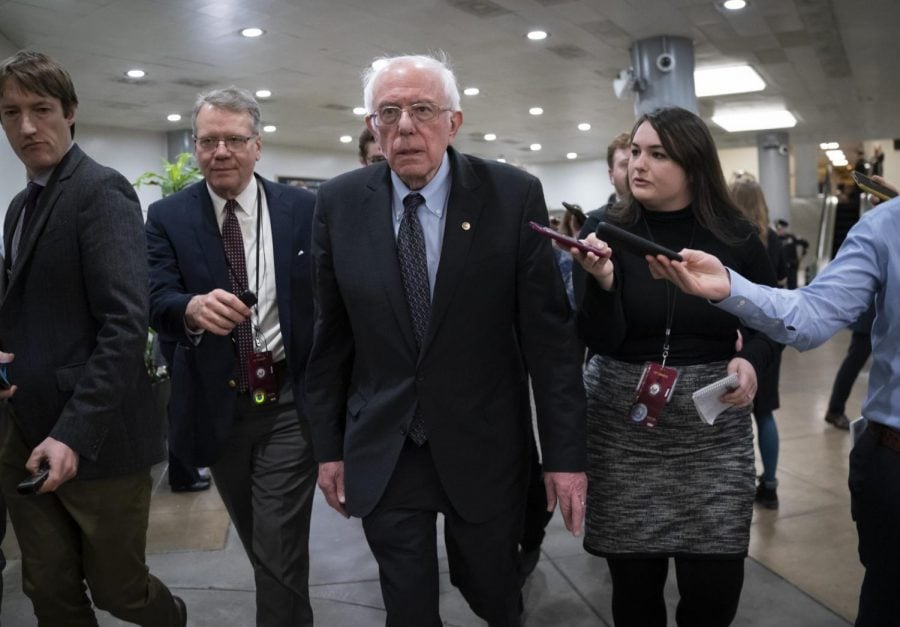Warren-Sanders clash was inevitable as voting gets closer
Democratic presidential candidate, Sen. Bernie Sanders, I-Vt., talks to reporters just after the start of the impeachment trial of President Donald Trump on charges of abuse of power and obstruction of Congress, at the Capitol in Washington, Thursday, Jan. 16, 2020.
WASHINGTON (AP) — As long as they are rivals, Elizabeth Warren and Bernie Sanders couldn’t stay friends forever.
The White House hopefuls and longtime allies have spent the past year throwing red meat to the party’s progressive base with calls for massive structural reforms to the nation’s political and economic life. The differences that existed — how quickly to transition to government-funded health care, how broadly to apply a wealth tax — were generally around the margins.
But as their he said-she said feud over whether Sanders told Warren a woman could not be elected president shows, the friendship ends as the voting begins. With the first votes of the Democratic primary just weeks away, the pair is not simply running against the rest of the field — Warren and Sanders are running against each other. And with that comes an urgent need to draw a contrast.
“Friends have fights,” said Randi Weingarten, president of the 1.7 million-member American Federation of Teachers. “Running for months and months, and with the proximity of Iowa, it’s not a surprise that there are nerves fraying.”
Weingarten called the nasty back-and-forth damaging and unnecessary because both candidates still share deeply progressive values. “How many different ways can we call this counterproductive?” she asked.
There’s a lot on the line since support in the Democratic primary could boil down to a finite number of voters and a zero-sum political game in which only one candidate, either Warren or Sanders, can consolidate progressive support enough to build a lane to the party’s nomination and potentially face President Donald Trump in November.
Polling has shown that neither Warren, a senator from Massachusetts, nor Sanders, a senator from Vermont, has pulled away to become the primary’s progressive standard-bearer. That’s less true among the race’s more moderate candidates. Former Vice President Joe Biden has maintained a consistent lead in most national polls over other centrist contenders such as Minnesota Sen. Amy Klobuchar and Pete Buttigieg, the former mayor of South Bend, Indiana.
The flare-up between Warren and Sanders has spooked progressive activists who worry the situation may deteriorate further and push undecided voters toward moderate alternatives. Six leading groups even released a “unity” statement Thursday expressing their “belief that the surest way to defeat Trump is for the Democratic Party to nominate either Warren or Sanders.”
“Sanders and Warren, as well as their campaigns and supporters, will need to find ways to cooperate,” they wrote. “The crossfire amplified by the media is unhelpful and does not reflect the relationship between two Senate colleagues who broadly worked well together for most of the last year.”
In the Capitol on Thursday, Warren and Sanders declined to comment further on their spat, which has pushed larger questions about sexism to the forefront. Both campaigns have consistently tried to downplay it as little more than a short-term feud, but that was undermined when the pair clashed during Tuesday night’s debate in Iowa and Warren refused to shake Sanders’ outstretched hand afterward.
And it was reignited on Wednesday night, when CNN, which co-sponsored the debate, released audio of the tense, post-debate exchange in which both Sanders and Warren accused the other of calling them “a liar.”
Democratic National Committee Chairman Tom Perez shrugged off the fight while visiting Wisconsin on Thursday, saying, “At this point in the primary process, skirmishes like this take place, but they should never obscure — and they won’t obscure — the fact that what unites us far exceeds what our differences are.”
In Warren and Sanders’ case, though, agreeing on so many top issues could be what fuels more tension. On health care, Warren was long an enthusiastic supporter of Medicare for All’s promise of universal, government-sponsored insurance, only to later pledge to work toward it within the first three years of her presidency. In the meantime, she said, she’d give many Americans a “choice” to keep their current, privately provided health insurance coverage.
Sanders has already laid that contrast bare, saying he’d send a full Medicare for All plan to Congress during his first week in office if elected.
Then there’s a wealth tax. A planned 2% levy on fortunes worth $50-plus million has become such a centerpiece of Warren’s campaign that she’s often interrupted at rallies by supporters chanting “2 cents! 2 cents!” But Sanders has subsequently released his own version that goes even further.
Even if a new round of open bickering doesn’t ensue over those and other issues, however, the question remains how Warren and Sanders will circle each other in the weeks before the Iowa caucuses without heightening the antagonism. That’s where Trump’s impeachment trial, which has begun in the Senate, could ease tensions. For the foreseeable future, it will pull both candidates off the campaign trail and into a chamber built on decorum that will only be amplified during impeachment proceedings.
“This is the most important thing they’re going to have to do, short of a vote for war,” said Jim Manley, a former top Democratic Senate aide. “You’re just going to have to make do the best you can and forget about taking your petty squabbles to the Senate floor because no one’s going to put up with it.”







